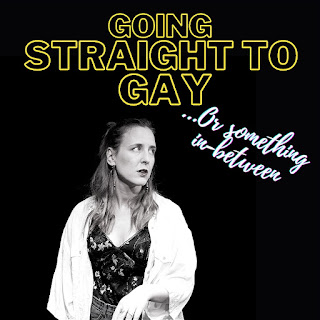Sunday, October 3, 2021
One Man Poe
Saturday, October 2, 2021
Clean! A Feminist Musical
Clean! A Feminist Musical
Going Straight to Gay... Or Something In-between
Going Straight to Gay... Or Something In-between is an hour long comic monologue delivered with gusto by actress Henriette Laursen. The topic is exactly as the title indicates. Laursen shares with the audience the highs and lows of her tempestuous love life, a life which just happens to involve falling in love with both men and women.
There are countless comic routines built around the traditional coming out story, so much so that in recent years it's become it's own subgenre. Some of Laursen's material focused on those old worn cliches, such as the father who struggles to talk openly about sex, and the frustration of family members delaying and interrupting her planned dramatic revelation. What made this evening special, and indeed exciting, were the parts that explored the particularities of her coming out as bisexual, not just to others, but to herself, recognising the impact of that identity on her own life and interactions.
It was fascinating listening to Laursen outline how differently she is treated when she's in public with a male partner as opposed to a female. She riffed on the peculiarities of going on a date with a woman, as a woman, having been socialised into dating the opposite sex. With two women, who buys the first round at the bar? How do you avoid the manipulation spiral? And worst of all, what do you do when you and your partner are the same size and she wants to 'borrow' your favourite jeans? Laursen mined every opportunity for comic potential, fully exploiting her actor training to deliver mini sketches and dialogues of her multitudinous relationship wrangles.
Laursen articulated confidently her unique perspective of experiencing the world both as a woman who others saw as 'straight' and fully conforming to the stereotypes of her gender, and also as a woman who others saw as 'gay', challenging those same conventions. This is a rarely explored point of view, and it gave her some fascinating insights into straight privilege, gender assumptions and the importance of Gay Pride which should be compulsory viewing for bigots everywhere.
Though her acting skills were an asset to the evening, the downside was that the comedy often felt forced. There was too great a dependence on the script and a resistance to spontaneity which made her relationship with the audience less intimate than it could have been. She often delivered a joke and then reversed it, breaking us out of the story she was spinning. I would have loved the monologue to be a bit shorter, so that time could be given at the end for a question and answer session where her idiosyncratic insights into life and love could be shared with a greater sense of direct connection. She's started an incredibly important conversation here, a conversation I'm sure many more people will be delighted to join.
Review: Heels Off, Kettle On
Proud Watford has become a hugely important cultural force in Watford, promoting inclusion and diversity through a range of artistic and cul...

-
This is the first year of the brand spanking new Chesham Fringe Festival, and watfordfringereviews.blogspot.com is delighted to be there i...
-
This is the first year of the brand spanking new Chesham Fringe Festival, and watfordfringereviews.blogspot.com is delighted to be there i...
-
Brazil. Cuba. Nigeria. Bangladesh. India. Britain. I have never before heard a more majestic fusion of sounds from across the globe brought ...





